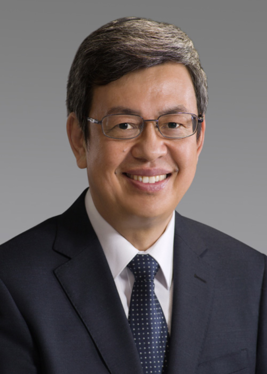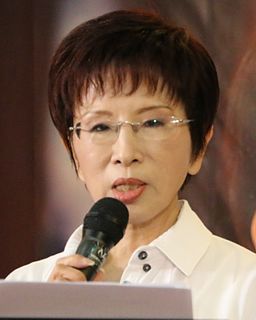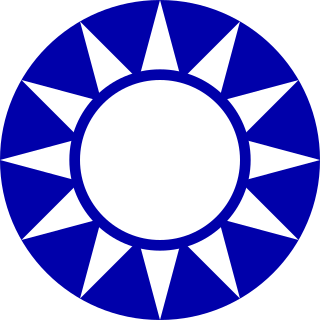The pan-Blue coalition, pan-Blue force or pan-Blue groups is a loose political coalition in Taiwan, consisting of the Kuomintang (KMT), the People First Party (PFP), New Party (CNP), Non-Partisan Solidarity Union (NPSU) and Minkuotang (MKT). The name comes from the party colours of the Kuomintang. This coalition tends to favor a Chinese nationalist identity over a separate Taiwanese one and favors a softer policy and greater economic linkage with the People's Republic of China, as opposed to the Pan-Green Coalition.

James Soong Chu-yu is a Taiwanese politician. He founded and chairs the People First Party, a smaller party in the Kuomintang (KMT)-led Pan-Blue Coalition.

The 10th President and Vice President election of the Republic of China was held on March 18, 2000, to elect the 10th-term President and Vice-President of the Republic of China under the 1947 Constitution. With a voter turnout of 82.69%, Chen Shui-bian and Annette Lu of the Democratic Progressive Party were elected president and vice president respectively with a slight plurality. This put an end to more than half a century of Kuomintang rule on Taiwan.
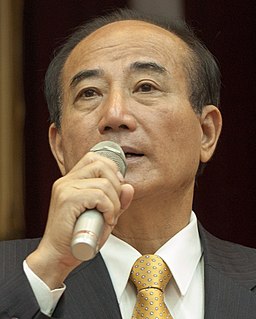
Wang Jin-pyng, is a Taiwanese politician. He served as President of the Legislative Yuan from 1999 to 2016, which makes him Taiwan's longest-serving legislative speaker. Once a leading figure of the Kuomintang (KMT), Wang is considered to be soft-spoken and a conciliatory figure who has often brokered deals between the KMT and opposition DPP. He was replaced by Democratic Progressive Party's Su Jia-chyuan as President of the Legislative Yuan after a decisive victory for the DPP in the 2016 election.

The Election for the 6th Legislative Yuan (第六屆立法委員選舉) of Taiwan was held on December 11, 2004. All 225 seats of the Legislative Yuan were up for election: 168 elected by popular vote, 41 elected on the basis of the proportion of nationwide votes received by participating political parties, eight elected from overseas Chinese constituencies on the basis of the proportion of nationwide votes received by participating political parties, eight elected by popular vote among the aboriginal populations. Members served three-year terms beginning on February 1, 2005, and ending January 31, 2008. The next term served four years.

This is a timeline of the Republic of China.
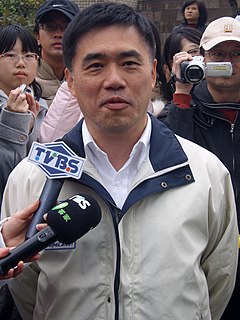
Hau Lung-pin is a Taiwanese politician. Elected to the Legislative Yuan in 1995, he resigned his seat to lead the Environmental Protection Administration in 2001. Hau stepped down in 2003 and served as Mayor of Taipei from 2006 to 2014. He is a member of the Kuomintang (KMT) and has served as vice chairman of the party in 2014 and since 2016.

The 13th President and Vice President election of the Republic of China was held on 14 January 2012. The election was held concurrently with legislative elections. It was the fifth direct election for the President of the Republic of China. Prior to 1996, the President was elected by the ROC's National Assembly and not directly by the people.
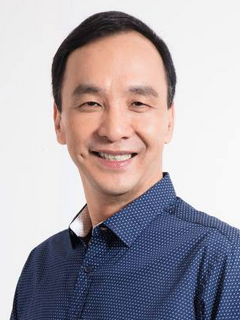
Eric Li-luan Chu is a Taiwanese politician and the incumbent Mayor of New Taipei. He was born into a political family with strong Kuomintang (KMT) ties, and served as Vice Premier of the Republic of China, under Premier Wu Den-yih. Prior to this, Chu served as legislator and as the magistrate of Taoyuan County. He was elected as the first mayor of the newly established city of New Taipei on 27 November 2010. On 17 January 2015, he was elected unopposed as Chairman of the Kuomintang, succeeding Ma Ying-jeou. On 17 October 2015, he was chosen as KMT candidate for the 2016 presidential election replacing incumbent candidate Hung Hsiu-chu. Chu was defeated by his opponent Tsai Ing-wen, and subsequently resigned his post as KMT chairman.

The 9th Republic of China Legislative Yuan election was held on 16 January 2016 for all 113 seats to the Legislative Yuan in Taiwan. The Democratic Progressive Party (DPP) led by Tsai Ing-wen, who also won the presidential election on the same day, secured a majority for the first time in history by winning 68 seats. The ruling Kuomintang (KMT) lost both the presidency and its legislative majority and returned to the opposition.

Apollo Chen, also known as Chen Shei-saint is a Taiwanese journalist and politician.

Tuan Yi-kang is a Taiwanese politician. A former leader of the Democratic Progressive Party's now-abolished New Tide faction, he has served on the party's Central Standing Committee, the Taipei City Council and the Legislative Yuan.

Yen Kuan-heng is a Taiwanese politician who has represented Taichung in the Legislative Yuan since 2013, when he succeeded his father Yen Ching-piao in office.
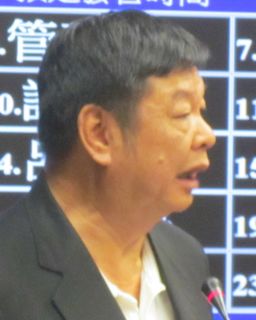
Chen Hsueh-sheng is a Taiwanese politician. He was the Magistrate of Lienchiang County from 2001 to 2009, and has represented Lienchiang County in the Legislative Yuan since 2012.

Rao Ching-ling is a Taiwanese politician.

The 15th President and Vice President election of Republic of China is scheduled to be held in Taiwan on 11 January 2020. Voters will either elect a new President and Vice President or re-elect the incumbents. The process of presidential primary elections and nominations are likely to be held during the last six months of 2019.


